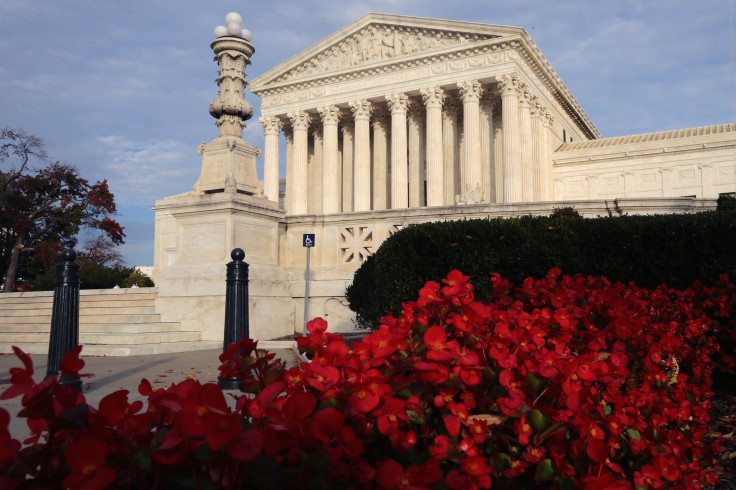Center For Competitive Politics v. Harris: Will The Supreme Court Hear Case On Nonprofit Donor Anonymity?

When a nonprofit group files its 990 form with the Internal Revenue Service, the names of its big donors typically are redacted, shielding from the public who is giving to what causes. Many have said such privacy flows from the First Amendment’s right for Americans to speak and to peaceably assemble, but some states are demanding lists of donors in full from nonprofits if those groups want to solicit donations in those states.
Such is the case in California, where last year Attorney General Kamala Harris started forcing nonprofits to turn over unredacted lists of donors if they wished to solicit in the nation's most populous state. The U.S. Supreme Court is now deciding whether it will hear a case, Center for Competitive Politics v. Harris, challenging her action, which she argues is necessary to investigate nonprofits’ finances. Critics have noted that California doesn’t have the same safeguards present at the federal level to shield donor names from the public, which could hurt fundraising efforts for nonprofits.
“[Donors] have relied historically on association privacy rights preserved by the First Amendment to anonymously support organizations they believe in and support political speech without having to disclose the donors behind that speech,” said Chad Readler, 43, a constitutional law attorney in Columbus, Ohio. “While some donors may not care about this, it’s likely that many will and make them think twice about if they want to contribute to an organization.”
Most nonprofits keep the names of their donors private on the assumption the right to disclose one’s donation rests with the donor. Some nonprofits are involved in controversial social and political issues, and their donors might be intimidated if they knew their names could be known widely, said Robert Alt, 42, president and CEO of the Buckeye Institute for Public Policy Solutions, a think tank in Columbus that filed a friend of the court brief with the Supreme Court on the case.
Donors want to remain anonymous for many reasons, said Diana Simpson, 29, an attorney with the Institute for Justice, an Arlington, Virginia, public interest law firm and author of another friend of the court brief on the case submitted to the Supreme Court. Some people want their names secret because they don’t want to be contacted by other organizations, while others may object to the release of their names on religious grounds or the simple fact they don’t want their donations made public.
Harris argues that California wants donor information to see if a nonprofit has violated the law. In most states, prosecutors who need the names of nonprofit donors can get them by obtaining a warrant, Simpson said.
“The Constitution doesn’t allow the government to increase efficiency at the cost of the protections it provides to its citizens,” Simpson said.
The Center for Competitive Politics, a nonprofit based in Alexandria, Virginia, that promotes First Amendment rights, sued Harris, trying to block California from getting the list of its donors, according to the SCOTUSblog. The 9th U.S. Circuit Court of Appeals in San Francisco sided with Harris, and now the Supreme Court is contemplating whether to step in.
“It’s deeply concerning; 47 other states don’t have this rule. They are able to regulate charities in an appropriate way without having to ask for this information,” Simpson said. Currently, New York and Florida also require nonprofits to provide donor names.
Other states, including Arizona, Michigan and South Carolina, filed briefs in support of the center, saying they are able to prosecute fraud committed by nonprofits without requiring lists of major donors.
Federal law has strong protections against redacted names being released by government employees, Alt said, but California does not have the same protections. In response to a request for comment, Harris's office said no Schedule B forms for the center were posted on the attorney general's website.
“The attorney general claims she wouldn’t release [names], but those claims are weak at best,” Alt said. “By comparison, under federal law when you file your return as a nonprofit, if those get released by someone at the [IRS], that is a crime. … Actually it’s a felony.”
Experts doubt that donor names would be protected if someone filed a public information request. Alt said it appears that California would be required to turn over donor names if someone asked.
Readler said there has been some debate in the legal community over whether public records requests would apply to nonprofit donors. He said there is no guarantee that public records disclosure laws wouldn’t apply.
Another year, another #obamacare challenge at #scotus - https://t.co/2yxVSSkKWc @Arianedevogue
— Zach Wolf (@zbyronwolf) November 6, 2015“There has been a long history in our country of association privacy,” Readler said. “We’ve also had a long history of anonymous political speech, and those rights are threatened by the disclosure of donor names to the government.”
Some legal scholars fear what a Supreme Court decision siding with the 9th Circuit would mean for the future of privacy in donations to nonprofits. Simpson said if the justices uphold the decision, it would open the door for the government to demand any information it wants from citizens.
“This would have a chilling effect on nonprofits, not only in soliciting donations but just operating in the state,” Alt said. “It would have a negative effect on those who participate actively with charities.”
If the high court agrees to take the case, the outcome is anyone's guess, but previous decisions -- such as Buckley v. Valeo (1978) and NAACP v. Alabama (1958) -- indicate that forced disclosure of names would be considered a First Amendment violation. In NAACP v. Alabama, during the civil rights struggles, the Supreme Court ruled unanimously that the state's attempt to force the NAACP to disclose their members would violate the U.S. Constitution.
© Copyright IBTimes 2025. All rights reserved.





















